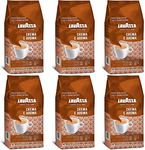Buying Guide for the Best Coffee Beans
Choosing the right coffee beans can significantly enhance your coffee experience, whether you're a casual drinker or a coffee enthusiast. The key to selecting the best coffee beans lies in understanding your personal taste preferences and how different factors like origin, roast level, and bean type can influence the flavor and aroma of your coffee. By familiarizing yourself with these aspects, you can make an informed decision that suits your palate and brewing method.OriginThe origin of coffee beans refers to the geographical location where they are grown. This is important because the climate, soil, and altitude of a region can greatly affect the flavor profile of the beans. For example, beans from Africa often have fruity and floral notes, while those from South America might be more nutty and chocolatey. To choose the right origin, consider what flavor profiles you enjoy. If you like bright and acidic flavors, African beans might be a good choice. For a smoother, more balanced cup, you might prefer beans from Central or South America.
Roast LevelRoast level indicates how long and at what temperature the coffee beans have been roasted. This is crucial because it affects the flavor, aroma, and strength of the coffee. Light roasts retain more of the bean's original flavors and are often more acidic, while medium roasts offer a balance of flavor and acidity. Dark roasts have a bolder, more robust flavor with less acidity. To choose the right roast level, think about your taste preference and brewing method. If you enjoy a more delicate, nuanced flavor, a light roast might be ideal. For a stronger, more intense coffee, a dark roast could be the way to go.
Bean TypeThere are two main types of coffee beans: Arabica and Robusta. Arabica beans are known for their smooth, mild flavor and are generally considered higher quality. Robusta beans have a stronger, more bitter taste and contain more caffeine. This spec is important because it influences the overall taste and caffeine content of your coffee. If you prefer a smoother, more refined cup, Arabica beans are likely the best choice. If you want a stronger, more robust flavor with a higher caffeine kick, Robusta beans might be more suitable.
FreshnessFreshness refers to how recently the coffee beans have been roasted. Freshly roasted beans are important because they retain more of their natural oils and flavors, resulting in a better-tasting cup of coffee. Coffee beans start to lose their freshness and flavor about two weeks after roasting. To ensure you're getting fresh beans, look for a roast date on the packaging and try to buy beans that have been roasted within the last two weeks. If you want the best flavor, aim to consume the beans within a month of roasting.
Processing MethodThe processing method describes how the coffee beans are extracted from the coffee cherries. This is important because it can affect the flavor and body of the coffee. Common methods include washed, natural, and honey processing. Washed processing tends to produce a cleaner, brighter flavor, while natural processing can result in a fruitier, heavier body. Honey processing is a middle ground, offering a balance of both. To choose the right processing method, consider what flavor characteristics you enjoy. If you prefer a clean, crisp cup, washed beans might be best. For a richer, more complex flavor, natural or honey-processed beans could be more appealing.














